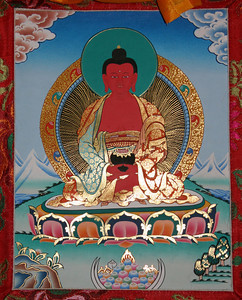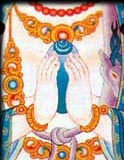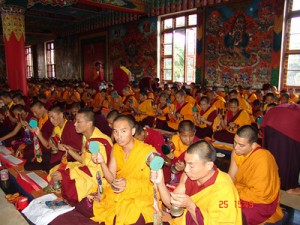In this excerpt from a teaching called The Dharma of Technology, Jetsunma is speaking to her students who had recently received the Rinchen Terzod from His Holiness Penor Rinpoche who conferred the Rinchen Terzod at Kunzang Palyul Choling in 1988
Do you remember in the empowerments in the Rinchen Terzod we had the opportunity to taste different things, something sweet and something bitter, then His Holiness said, “Who is the taster? You know what makes this sweet and this bitter?” The taster does, because if you tried to find the essence of the thing that you’re looking at, remember, if you divided it down and looked at it under the microscope you would never find its thing-ness. In fact, you would never find its sweetness. Which molecule is the sweet one? You would never really find that. What is sweet is sweet to the tongue and the tongue is the determiner of that taste. Who does the tongue belong to? The tongue belongs to you. So you, in fact, are the one that determines whether the thing is sweet or not. You are the taster. And so when you examine yourself and you boil everything down and smear it on the microscope, you can’t find where you are, then you realize that sweet and sour, sweet and bitter are concepts and they are just proliferations of the mind.
In the same way, this person that drives you crazy and this person that is the precious jewel in your life are equal. It is the hatred and the desire, the hope and fear, the attraction and aversion in your mind that causes you to make a difference between them. If you looked at them with the mind of enlightenment, you would see that they are the same. Yet we all have our likes and dislikes. But somehow through our practice, we have to accomplish such pure view, free of desire and on fire with love that they are the same. We have to give our lives equally for both of them. We have to be willing to eat an ocean of suffering for the ones we can’t stand and for the ones we truly love. It’s easy to make sacrifices for the ones you love. It’s easy to make sacrifices for your children. That’s not hard. Anyone can do that. I was reading the other day about a creature called a midge. It conceives its children inside its belly and then as the children grow, they eat the mother from inside out and the mother dies. It’s a shell and it opens up and the children come out. And then after a while they reproduce in the same way. If a little bug can do that, if it can give its life to nurture its children, you can do that. That’s not hard. That happens even on the lowest realms.
What’s really hard is to give your life for all sentient beings, the ones that you know and the ones that you don’t know and to do so in a way so that the ones that you can’t stand are equal to the precious pearls in your life. They have to be the same. If you give only so much and you stop giving, only extending your love to your family or friends and to the people that you know here, or your nation or your planet or even your universe — what about the other 2,999 myriads of universes? What about all of the sentient beings who are, with hatred in your heart, not worthy of your love, but with love in your heart, the same as you?
That’s when you have accomplished Dharma, when your love is that great, when you are that mindful of compassion, when through your meditation and through your practice, and through your understanding of the Buddha’s teachings, you have come to understand the equality of all that lives, that they are the same mind, the same uncontrived primordial wisdom nature, that they only appear to be different. They suffer, they live and they die because of their confusion. What makes the ones you hate so hateful? First of all, it’s your vision of them. You are the taster. Someone else loves them. Who loves them is the same as you and you’re the same as them. The difference is the particular karmic pattern of attraction and repulsion, of desire that manifests in your life.
The one that you hate is the same nature as you with the same capabilities, with the same desire to be happy. The difference is that this person may be confused and the only way they know how to reach for happiness is in the ways that make them unhappy. And of course you, in your hatred and your greed and your ignorance interpret their activity because of the karma of your mind. This sounds like elementary stuff. The sun pours forth and it doesn’t say, “Well, I think I’ll go to violets today and roses are going to be in the dark.” The sun doesn’t do that. Its nature is to pour forth and embrace all life and it is the source of life. Your compassion, your mind is like that in its natural state. It is that all-pervasive compassionate reality, that all pervasive non-dual mind state and so your love has to be that way. Your accomplishment of Dharma has to be like that, with that understanding.
It sounds elementary. It sounds simple. But we still hate. We still judge. We still have the seeds for war in our bodies and in our minds. We still have the seeds for old age, sickness and death. We still have the seeds for all the six kinds of suffering in all of the six realms, and so in that way, we have not accomplished Dharma.
Copyright © Jetsunma Ahkon Lhamo. All rights reserved




